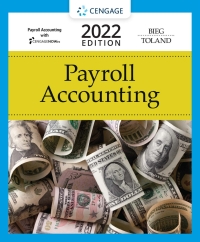Question
David Jetter graduated from college six years ago with a finance undergraduate degree. Although he is satisfied with his current job, his goal is to
David Jetter graduated from college six years ago with a finance undergraduate degree. Although he is satisfied with his current job, his goal is to become an investment banker. He feels that an MBA degree would allow him to achieve his goal. After examining schools, he has narrowed his choice to either UCSD San Diego or Palomar College. Although internships are encouraged by both schools, to get class credit for the internship, no salary can be paid. Other than internships, neither school will allow its students to work while enrolled in its MBA program.
David currently works at the money management firm of Dewey and Louis. His annual salary at the firm is $60,000 per year, and his salary expected to increase at 4 % per year until retirement. He is currently 25 years old and expects to work for 45 more years. His current job includes a fully paid health insurance plan, and his current average tax rate is 30 %. David has savings account with enough money to cover the entire cost of his MBA program.
UCSD is one of the top MBA programs in the country. The MBA degree requires two years of full time enrollment at the university. The annual tuition is $75,000, payable at the beginning of each school year. Books and other supplies are estimated to cost $4000 per year. David expects that after graduation from UC, he will receive a job offer for about $120,000 per year, with a $25,000 signing bonus. The salary at this job will increase at 5 % per year. Because of the higher salary, his average income tax rate will increase to 35 %. Palomar College is smaller and less well known than UCSD. Palomar offers an accelerated, one year program, with a tuition cost of $85,000 to be paid upon matriculation. Books and other supplies for the program are expected to cost $5,500. David thinks that he will receive an offer of $95,000 per year upon the graduation, with an $19,000 signing bonus. The salary at this job will increase at 3.5 % per year. His average tax rate at this level of income will be 29 %. Both schools offer a health insurance plan that will cost $3,000 per year, payable at the beginning of the year. David also estimates that room and board expenses will cost $2,500 more per year at both schools than his current expenses, payable at the beginning of each year. The appropriate discount rate is 7 percent.
1. How does Davids age affect his decision to get an MBA? Explain why?
2. What other, perhaps non- quantifiable factors affect Davids decision to get an MBA? Explain in detail.
3. Assuming all salaries are paid at the end of each year, what is the best option for David from a strictly financial standpoint? Explain why in detail with calculations.
4. David believes that the appropriate analysis is to calculate the future value of each option. How would you evaluate this statement? So what is the future value of each option?
5. What initial salary would David need to receive to make him indifferent between attending UCSD University and staying in his current position? Explain in detail with calculations.
Step by Step Solution
There are 3 Steps involved in it
Step: 1

Get Instant Access to Expert-Tailored Solutions
See step-by-step solutions with expert insights and AI powered tools for academic success
Step: 2

Step: 3

Ace Your Homework with AI
Get the answers you need in no time with our AI-driven, step-by-step assistance
Get Started


